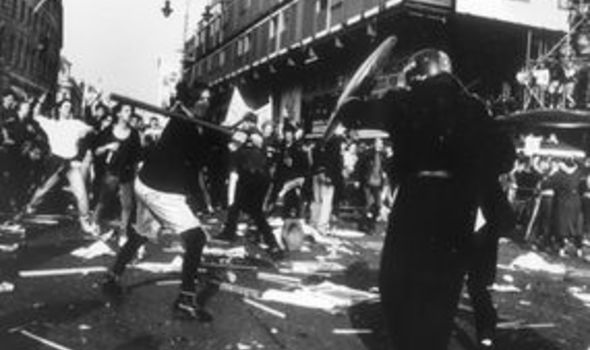MI5 ALERT ON BANK RIOTS

Roit police come under heavy attack from Poll Tax rioters
Sunday March 1,2009
By Geraint Jones
TOP secret contingency plans have been drawn up to counter the threat posed by a “summer of discontent” in Britain.
The “double-whammy” of the worst economic crisis in living memory and a motley crew of political extremists determined to stir up civil disorder has led to the extraordinary step of the Army being put on standby.
MI5 and Special Branch are targeting activists they fear could inflame anger over job losses and payouts to failed bankers.
One of the most notorious anarchist websites, Class War, asks: “How to keep warm during the credit crunch? Burn a banker.”
Such remarks have rung alarm bells in Scotland Yard and the Ministry of Defence.
Intelligence sources said the police, backed by MI5, are determined to stay on top of a situation that could spiral out of control as the recession bites deep.
The chilling prospect of soldiers being drafted on to the streets has not been discounted, although it is regarded as a last resort.
What worries emergency planners most is that the middle classes, now struggling to cope with unemployment and repossessions, may take to the streets with the disenfranchised.
The source said “this potent cocktail is reminiscent of the poll tax riots which fatally wounded Margaret Thatcher’s government in 1990”.
Last night Scotland Yard vowed it was ready to face any threat. A source said: “We do have a policing plan in place and we have riot police officers trained for such measures.”
But other senior police leaders fear the force will be unable to cope.
Were that to be the case, the Government has a contingency plan to deploy troops on the streets of Britain’s major cities.
A senior source said: “This is a very real, and very serious, problem.
“I can tell you there have been crisis talks in Whitehall about this.
“Half the senior officers in Britain have been warning the Home Secretary about the dangerous effects that reducing police manpower may have this summer, especially in the industrial heartlands.
“We are not just talking about the problems of immigration and British jobs for British worker. We are also talking about mass unemployment.
“In many of our industrial cities, this will not be measured in the hundreds, but in the thousands. With unemployment, comes the risk of increased crime. Some forces, such as South Wales, have publically stated they would be swamped.
“Others are keeping it quiet, but you can be sure they are trying to make the Home Secretary listen, before it’s too late.”
The “protest season” is due to begin on April 1 with the G20 Summit in London next month, followed by the 60th anniversary of Nato in Strasbourg a few days later. May Day is also potentially a flashpoint.
Ministers cannot afford to allow latent public anger at Government policy to get out of hand if they are to maintain credibility through what promises to be Gordon Brown’s most testing period as Prime Minister.
The Stop the War coalition, orchestrating the G20 protest, said: “The first week of April could be a week of world leaders will never forget.”
The British authorities want to avoid a repeat of the rioting that scarred British cities in the 1980s Then, as now, the country was in recession with rising unemployment and deep public hostility to perceived social divisions.
Today that anger is focused on the banks, with their bonus culture surviving despite billions being paid in taxpayer bail-outs.
This has fomented in the outrage over news that senior executives will be rewarded for their failure.
Sir Fred Goodwin, former boss of RBS, has refused to hand back his £693,000-a-year-pension even as the ailing bank announced a £24billion loss last year, the single largest loss in British corporate history.
Early warnings of trouble ahead came from the furore over last months “British jobs for British workers” protest and wildcat strikes across the country.
This week Britain’s most senior police officer warned that the summer could bring a wave of protests orchestrated by extremists in which ordinary people, fired by their own anger and fear at the economic downturn – became “foot soldiers”.
Superintendent David Hartshorn, who heads the Met’s public order branch, identified the G20 as the possible start of a “summer of rage”.
Murray Benham, head of campaigns at the UK-based World Development Movement, accused Supt Hartshorn of “scaremongering”.
“Scaremongering from the police will not stop us because the price for failing is too high.
“People are understandably angry about the impact of the economic crisis on their jobs, savings and plans for the future.”
Additional reporting by James Fielding





















